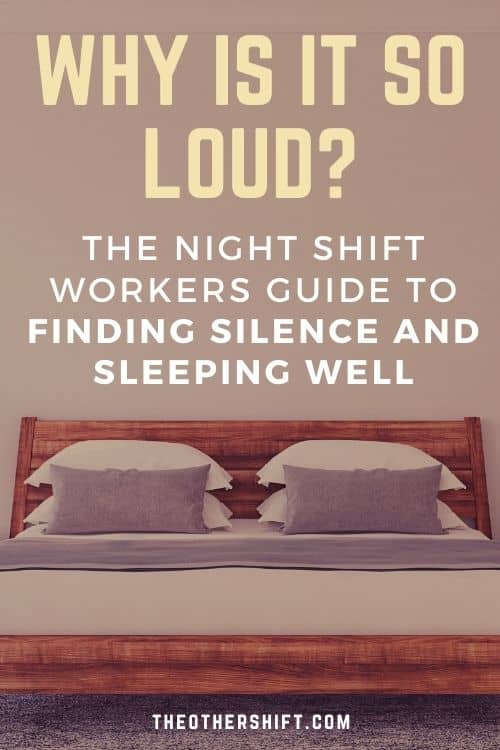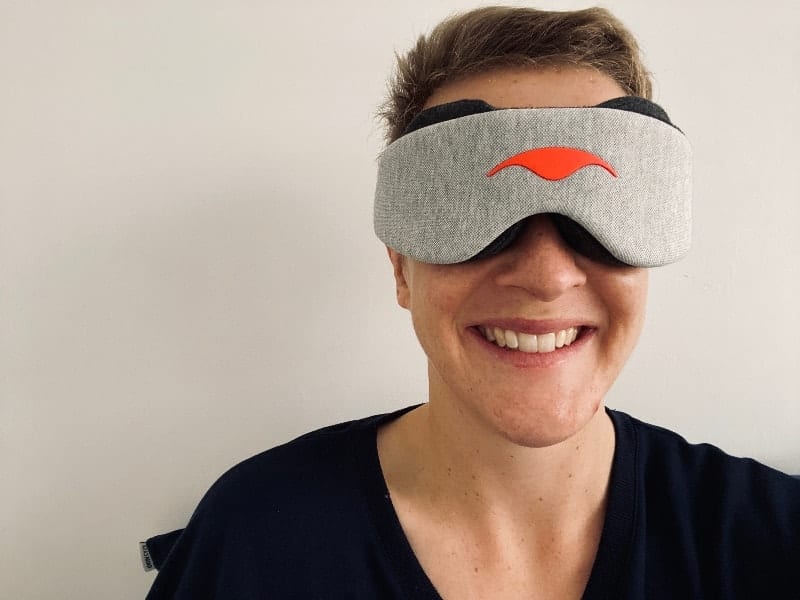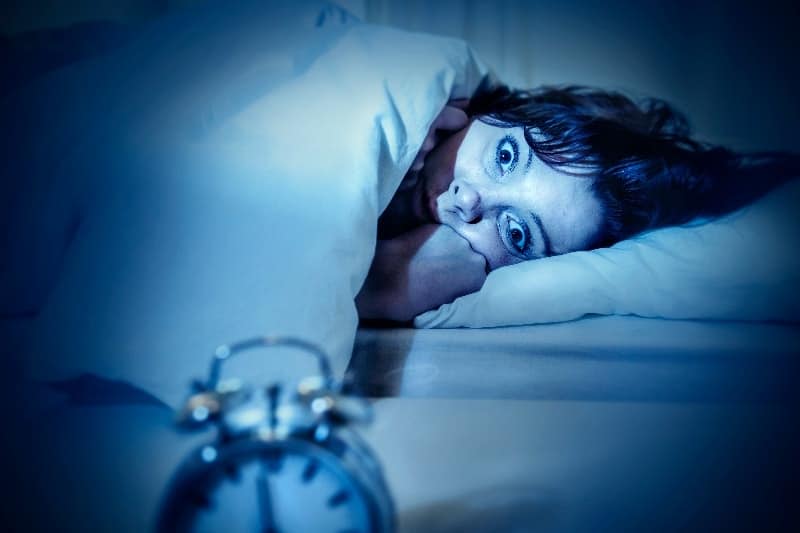Disclosure: This page may contain affiliate links, meaning we receive a commission if you decide to make a purchase through our links, but this is at no additional cost to you. Please read our disclosure and privacy statement for more info.
As busy night shift workers, we know the essential role sleep plays in health and strengthening our immune system; that’s why when we get woken up due to noise it can be so darn frustrating! Though we might not fully wake up to every bang, crack and thud our subconscious is disrupted preventing us from proceeding into a deeper sleep where all the repairing occurs.
Noise prevents sleep initiation and progression leading to significant health effects. To minimize noise, night shift workers should; relocate or soundproof the bedroom, use white noise, update appliances, create a dark environment, avoid stimulants, communicate honestly, address snoring and be mindful of light.

As a night shift worker, it can be very challenging to avoid noise pollution as this study rightly refers to is as. However, this doesn’t mean all hope is lost and we should simply give up. Throughout this post, we explore how and where night shift workers can find silence to achieve a better day’s sleep.
How Night Shift Workers Can Find Silence
After working the night shift, you’ll probably want to hit the hay immediately after a nice warm shower and few mouthfuls of something yum. The harsh reality of the night shift though is that noise interference is everywhere often disturbing this dream plan.
Unless you live in a cave, your “done up” basement or have totally soundproofed your bedroom – which we will get to in a second, noise from your neighbors, people in your own house, machines around the home, and means of transportation will continue to drive you nuts.
Sometimes it can be difficult to control these environmental noises because you may live next to a subway or highway or have extremely social neighbors. In this case, you’ll need to find a way to protect yourself from the noises coming inside. The next part of this post will explore a number of ways you can make silence a reality as 3rd shift worker.
1. Change Your Room Position
Where is your bedroom located? If you sleep in a room next to most of the other family member’s activity, you might want to consider moving to a different location within your home. Find a room furthest to the main high activity room if you have people around when you need your rest. Doing this prevents the sounds from reaching your space quickly.
I know a night shift nurse who decked out the basement of her house as a “last resort” and has never looked back. Its cool, dark and quite she says – the perfect recipe for a heavily day time sleep! If you have a basement, could this be a reality for you too?
If you live in a small apartment surrounded by noise, simply moving bedrooms is probably not an option for you. You might want to consider something else like using these slick sleeping headphones or this bluetooth variety which also acts an eye mask. The reviews are pretty impressive and worth a try. I’d much prefer to fall asleep listening to my own playlist than that of my neighbor!

2. Soundproof Your Bedroom
If your window is the primary entry of noise, install soundproof windows to keep your space silent. You can also put foam in openings around your window to limit the noise. Otherwise, consider going a little more extreme and make your whole bedroom soundproof! Doing this will surely keep all noises away.
Here is a video (shown below) on some quick sound proofing tips.
If you can’t insulate your room at the moment, don’t panic, there are other ways to mask the noise. Add soft surfaces to your room. In smooth surfaces, the sound gets absorbed, unlike hard surfaces that bounce back sound. You can add items to your space that will interest sound, like; cushioned furniture, rugs, and thick curtains.
We did write an article titled, Shift Work Bedroom Ideas: Create the Ultimate Sleeping Oasis which also might come in handy about now.
You can put books against your door or walls that let in the most noise to help absorb sound from other rooms. Adding all of these items to your bedroom could help absorb sound from the outside or inside your house.
3. Get Rid of Noisy Appliances
Is your fridge or air conditioner/heater producing excessive noise that’s super distracting? Having it repaired to reduce the noise (and probably your electricity bill). It may be the best decision you’ve made in a long time!
4. Update Your Bedding
Maybe you get woken easily from sleep because your bed isn’t as comfortable as it should be or it creaks more than your knees! A good mattress, sheets, (we LOVE these Nolah Mattress Protectors and Sheets) and a weighted blanket (this one is super cosy!) may initially seem expensive but it’s worth every cent.
Invest in these items so that you won’t have aches or itches when you wake up from a sleep that was supposed to be restful. Those aches could prevent you from being productive at work, and you’ll feel drowsy all day long.
While you’re updating your bedroom, don’t forget about your furry friends bed. Be honest with yourself, is your dog the cause of excessive noise? Will a new bed help or do you need more support?
Related post: Owning a Dog as a Shift Worker: Clever Tips to Make It Work

Layla Pet Bed – Large Size – 2 in 1 Beds – Flippable Firmness – Durable & Machine Washable
5. Use Earplugs and Eye Masks
No all of us can soundproof our bedrooms because of various reasons, and that’s okay. Using earplugs could help you out as long they don’t interfere with your ability to sleep. A study done on critically ill patients showed that earplugs and eye masks increased the length of N3 sleep.
The ones we are wearing below are from Swanwick Sleep. They are made from silk and are oversized and is why we love them. Get yourself one here.


6. Speak Up
If there are people in your house or your neighborhood who make noise and hinder you from a restful sleep, talk to them and negotiate.
You can ask them not to use the lawnmower when you’re sleeping or request your roommates or family members to use earphones when watching the tv. Can you compromise and say you’ll mow the lawn when you get up? Seems excessive by may be a good solution.
Having silence around you will help you acquire deep sleep that will be more restful. Planning out everything before you sleep can reduce the anxiousness to wake up early. You can prepare your meals ahead, lay out your clothes and do all those other things that could help reduce the stress of having to wake up early.
Related post: Living with a Shift Worker? 8 Tips To Make It Work For All
7. Address Snoring
Does your partner snore and it’s keeping you awake? There is a simple solution and it’s called Vital Sleep.
It’s a well fitted mouthguard which opens up the parts of the jaw responsible for snoring.
If you and your significant other tend to sleep simultaneously, this means that you may experience noise disturbances if your partner snores. Take a look at this anti-snoring devices that will help your partner sleep better and help you sleep without interference.
This device is very cool and so easy to implement to make a huge difference.
How to Make Good Use of Sounds Whilst On Night Shift
If you can’t avoid noise no matter how hard you’ve tried, you can use some other sound to cancel out the different interruptive sounds.
As much as sounds can be harmful your health, you can use consistent background noise to help you sleep better. When the sounds are inconsistent, that’s when you get aroused from sleep.
Importance of a Noise Machine
A noise machine provides consistent noise that helps the body rest and fall into a deep slumber. White noise helps in blocking out environmental noise that could interfere with sleep.
Here are a few examples of what white noise sounds like;
You can get yourself a white noise machine like this one that offers white noise or gentle rain as an option. Here are some reasons why we love them;
- They help build routine. Once your body gets used to these sounds, it automatically knows it’s time to sleep. We all know how routine is essential for sleep. Turning on the machine once you get to bed should be the last thing in your routine.
- It helps you relax. For many people, falling asleep is complex because they can’t stop thinking. The brain always finds various ways to keep us awake. Anxious thoughts always come, especially when in bed trying to rest. That is when you will remember that you needed to take out the trash, among other millions of things on your to-do list. A noise machine helps in drowning out your thoughts and relax your mind.
- It is a good option for those people who can’t stand silence. If you are fond of sleeping to some noise, a noise machine will help you out. During summer, you can use a fan or air conditioning to provide consistent hum to induce sleep.
- Noise machines are helpful for better sleep. They generally help lower anxiety and stay asleep for the whole duration that we need.

 (click to see the amazing reviews on Amazon)
(click to see the amazing reviews on Amazon)Tips for Falling Asleep After Noise Disruption
Sometimes a loud bang or unnecessary noise could steer you awake. After a long night shift, being up pre-maturely is the last thing you need. To counter this and fall asleep again, below are tips that could help you out.
- Do not check your phone or open your curtains. Doing this will stop the production of melatonin, preventing you from going back to sleep. Exposure to any light will terminate your sleep altogether.
- Do not stay in bed if you can’t fall asleep again quickly. After a period of time, around 30 minutes for most, your body will start to disassociate your bed and sleep. if you can’t sleep, get up and do something boring or repetitive like folding the washing or ironing whilst staying the dark if possible or wearing your Swannies, then try again.
Also importantly, lying awake in bed will lead to more thoughts running through your head, keeping you up. Occupy yourself with a novel or journal or something soothing that will help you fall asleep. Do not turn on any devices or television.
- Make yourself comfortable. If you need to empty your bladder, visit the bathroom. You can also adjust the room temperature to make sure that it is a bit cooler but not too chilly. Cooler temperatures are better for inducing sleep.
- Relax your body. You can do progressive relaxation, which involves tensing each much to your body then release it. Your body will eventually relax. You can also try deep breathing or meditating. It is more likely you’ll fall asleep while meditating. Deep breathing also helps your body and mind calm down, which will bring along sleep.
Another good option for white noise – without the machine – is to use a fan. If you don’t want the breeze simply point it towards the wall.
Related post: 9 Shift Work Best Practices You’re Probably Not Doing

Other Considerations for Night Shift Workers
Make Your Room As Dark As Possible
Our bodies have a circadian rhythm, meaning that we stay active in the presence of light, and in darkness, we sleep. Our sleep hormone melatonin, which we talk about a lot here, demands darkness to start doing it’s thing.
The sunlight makes us fail to fall asleep because the blue light in natural sunlight regulates the sleep-wake cycle, preventing melatonin production. Exposure to sunlight makes us stay awake. Blocking out light could help you lose asleep even during the daytime.
Making your room dark helps in retaining this natural rhythm. Using blackout like these popular ones from Amazon, blackout curtains can make your room is as dark as night. Aiming for 100% is not unrealistic!
Related post: How to Get Enough Vitamin D When Working Night Shift
On our YouTube channel, a fellow night shift worker commented with the following and we couldn’t agree more;
“Aluminum foil works great for blocking out light. Sse a fan for the sound”.
Keep the Lights On During Your Night Shift
Do not dim lights on your devices (computer, phones) and surroundings during your night shift, though night shift mode is great when on day shift.
Exposing yourself to as much light during your shift as possible will help trick your body’s circadian rhythm. I know it sounds a little cruel to your tender sleep hormones but it can be effective in the short term.
You could also buy a clever light therapy box. These lightboxes help mimic the sun making your body feel awake and alert during your night shift. I haven’t personally jumped on the lightbox therapy bandwagon as I simply keep the lights on and try to stay active overnight, but I’ve heard it can be work brilliantly for those working alone.
By the time your shift is over, you should feel naturally tired and be ready for your sleep – after a necessary wind-down period of course.
Related post: Tips To Staying Awake On Night Shift (and Avoid Grumpiness)
Minimize Light Exposure to Light Before Bed
What? Now I need to limit my exposure to light… I’m confused!
The impact of light on our sleep is immense, so on your way home, wear glasses that could help block out the sun. We suggest wearing dark sunglasses and NOT blue-light glasses (just yet).
Sunglasses will help prevent the morning glare and reduce the UV rays without putting you to sleep like blue light blocking glasses will. But swap your specks once you get home.
If you’re new to this blog, our favorite blue light blocking glasses are from Swanwick Sleep which you can check out our review below.
Remember to keep these glasses on while making breakfast, brushing your teeth, talking to your family and even watching TV and scrolling on your phone.
Avoid Caffeine and Alcohol Before Bed
When beginning your shift, it’s okay to have a cup of coffee. I struggle to get my butt into gear without a big cup of tea! But you should be wary about pouring another cup later in your shift as it may compromise your sleep.
It’s important to note that the caffeine we drink is not just the problem. It can be found in energy drinks, tea, and even chocolate. Make sure to leave these caffeine goodies alone once you get home from your night shift and leave them for “breakfast” once you get up.
Caffeine makes you alert for long periods meaning that you’ll limit it somehow if you’re going to have a sleep after your shift. It can be tricky avoiding caffeine during your night shift, so focus on avoiding anything caffeinated at least 4-6 hours before you need to sleep.
Alcohol on the other hand, helps with sleep during the first part of the night. It sedates you for the first half of the sleep, then the rest of the sleep, you tend to be restless and have brief periods of sleep. These disturbances are due to the metabolism of alcohol. To prevent waking up regularly in the other half of your sleep, you should think twice about ordering a beer when going out after the night shift with your colleagues.
Doing this on the add occasion is totally okay and can help build social connections with your colleagues, just don’t make it a regular habit for the sake of your sleep.
Avoid Bringing Work Home
If you can, try and limit the amount of work you are bringing home. Save checking your emails and making work calls until you get to work if you can. I often go into work 30 minutes earlier to complete these tasks so I don’t have to torture Dan with my mood swings and excessive work talk.
Track Your Sleep
Sleep tracking can help you determine whether you’re getting enough sleep, despite what you may think. Sleep trackers help you know what your sleep cycle is and how often you get roused from sleep.
Tracking your sleep could also help you realize how much sleep you ideally need in a night and help you form an ideal sleep pattern that will benefit you.
Move Your Body
I don’t know about you, but I sleep significantly better after a workout.
A workout leads to the production of endorphins. After these endorphins have gone down, the body feels the need to rest, which requires sleep. Exercise helps with sleep as it reduces sleep onset. This means that you won’t stay turning and tossing in bed before you fall asleep.
Also, since exercise helps manage weight, it is less likely that people who work out regularly will experience illnesses that add weight, like sleep apnea. Working out during the day can also prevent daytime sleepiness by keeping you active.
Twenty to thirty minutes of workouting regularly could help boost your sleep quality. Some people find that working out within three hours of your bedtime will interfere with your sleep ability due to the adrenaline surge while others find it helpful to sleep.
We wrote this article discussing when is the best time to work out when working night shift which may help you sleep regardless of the noise around you!
Develop a Sleep Schedule
Though getting home after the 3rd shift can seem like the hard part (take a look at this post about driving after nights) it’s often what we do after a shift that self sabotaging.
Instead of attempting chores that need doing, you should also prioritize your sleep. Sometimes you can get engaged in all the activities and even housework that need doing, you end up forgetting to sleep or minimising the time we spend doing it, leading to nasty effects you can explore in this post.
Make sure you have a schedule for when you should get to bed. When you get used to this, your body will automatically signal you when it’s time to sleep. Having a sleep schedule gives your body rhythm, telling it when to sleep and when to be active. Go to bed and rise up at the same time daily.
I’ve included a video below I made for what you’re switching from night shift to day to shift as it’s impreative you find a new routine to get your body clock back on track.
Final Words: Night Shift and Noise. How and Where To Find Silence
With civilization comes the need for companies to keep their work going twenty-four hours a day. Essential workers like nurses and doctors work most nights to make sure people don’t lose their lives. This sacrifice comes at a cost as they have to interchange their sleep time from night to daytime.
Noise can be very harmful to your health, mainly when it affects your sleep. Most people are active during the day producing too much noise. To counter this, there are various ways a night shift worker can ensure they get enough sleep during the day. Like; soundproofing your space, using sleep devices, and making your room black as night, among others. These tips are necessary if you want to avoid sleep deprivation and illnesses that come with it (blood pressure and cardiovascular disorders).

Disclosure: This page may contain affiliate links, meaning we receive a commission if you decide to make a purchase through our links, but this is at no additional cost to you. Please read our disclosure and privacy statement for more info.
2 thoughts on “Night Shift and Noise. How and Where To Find Silence”
Leave a Reply
Recent Posts
An examination of the night shift professions, that while sometimes underappreciated, are necessary for civilization, in its current form, to exist. A city can be thought of as a machine. Each...
Culminated from an exhaustive yet well-funded journey into the night, this article will prepare you for life outside of work while being a denizen of the dark. During days off, night shift...




This all sounds a bit too idealistic to me. After 20 years on minimum wage night jobs I’ve never had the funds to soundproof a room. Neighbour who I share a wall with has been doing “DIY” for the last 3 years preventing me sleeping and my health has suffered greatly.
Three years of banging, tapping, knocking, slamming doors, sawing, sanding, hammering, and there is zero power for anyone unfortunate enough to have to work nights. My single night off a week I must remain quiet. Their semi retired so can make as much noise as they please during the day. When approached they simply say it’s “their right to work on their property”. What about my right to peaceful enjoyment of my home? Doesn’t exist for night workers apparently.
My local authority say they can’t do anything. People online(those who never had such a problem) give the great advice of “just deal with it”. When I die of a heart attack it won’t mention my neighbours inconsiderateness on the death certificate. And people will say I should have somehow lived a healthier life…as if I had a choice.
Hi David,
We thank you for grinding away on the night shift for over 20 years! We know the schedule all too well and it takes a special person to be able to stay the course for that long. It also sounds like your living situation doesn’t help in your ability to function as we’d like on nights and I hope you can find a happy medium with your neighbours, or potentially find somewhere a little quieter for you to get the sleep you need and deserve.
We appreciate you taking the time to read our article and make comment.
Cheers!